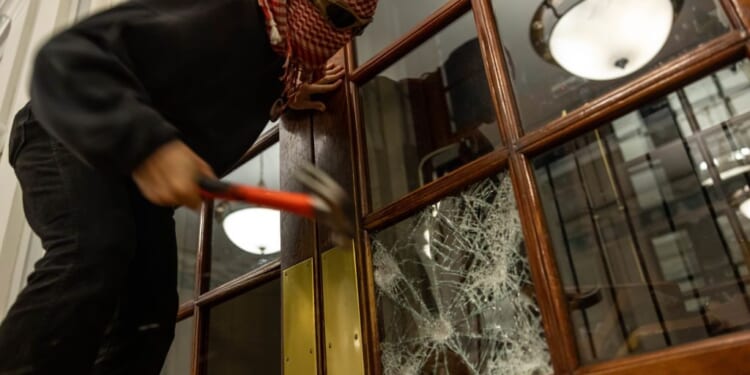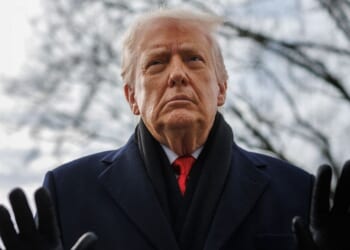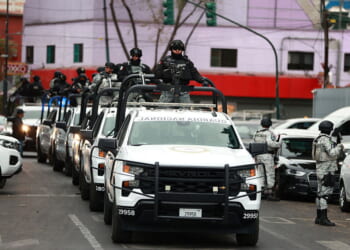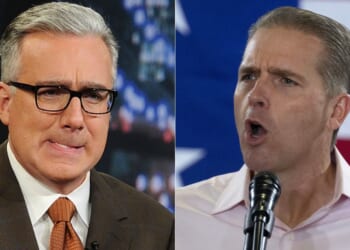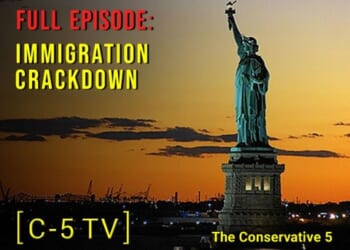In October 2024, pro-Palestinian activists marched on Columbia University’s campus, on New York’s Upper West Side, chanting “Resistance is glorious! We will be victorious!” They held up signs that read “LONG LIVE THE AL-AQSA FLOOD,” commemorating Hamas’s murderous assault on southern Israel on Oct. 7. One of my professors, struggling to make herself heard over the cacophony, told us that students had been emailing her, telling her that they did not feel safe and would be absent. Another professor told us that we’d be welcome to leave for “personal reasons.”
Such turmoil had become a routine part of campus life. It was as if the faculty and student body were expected to accept constant disruption, including the occupation of major buildings (Hamilton Hall and Butler Library); the hostage-taking of janitors (whom the protesters allegedly threatened as “Jew lovers” that they wished to “fuck up”); and the distribution of pamphlets that could’ve come straight from the Hamas Media Office.
But then, something changed. This Oct. 7, for the first time in two years, a newfound tranquility prevailed. The group of pro-Palestinian agitators was small and mainly huddled outside the main gates on Broadway and 116th Street. There were no large disruptions or violent clashes with the authorities. My friends and I were shocked by how peaceful the day went: the protests took less time and featured far more measured rhetoric.
The Columbia Intifada, it seems, has died down — thanks to President Trump. His campus measures are unquestionably illiberal. But they’ve paradoxically helped to preserve reasonable discourse on campus.
The scale of the cultural transformation is astonishing. As I looked through X, expecting to encounter the grievances of pro-Israel activists, I saw none. Lishi Baker, arguably Columbia’s most prominent Zionist activist, had only reposted images of inflammatory protest flyers out of Stanford, Concordia, Liverpool, and the University of Toronto-Mississauga — but not a single item pertaining to Columbia.
To be clear, this doesn’t mean that corrosive pro-Palestinian radicalism has been totally eliminated. A pamphlet published by Students for Justice in Palestine commemorated “two years of resistance.” The tract justified Hamas operations against the “israeli Occupation Forces”—“israeli” written in all-lowercase letters, lest the students lend legitimacy to the Jewish state. Atop the tract, there was a disclaimer that it was “not affiliated with the terrorist, imperialist, Nazi-Zionist, colonizing, pig-loving, genocidal, war-profiteering ‘institution’ known as Columbia University.”
At around 3 p.m., waiting at the 116th Street Station, I saw a posse of girls clad in keffiyehs and Palestinian flags heading aboard the 1 Train downtown. The air of disappointment about them was unmistakable.
Over the past two years, Columbia’s campus culture became ontologically perverse. What the campus ideologues promoted was not a principled stand for stopping the death and ending the war — a feat Trump may have just accomplished — but a solidarity politics of donning keffiyehs, equating the NYPD to the KKK, and blindly using buzzwords like “decolonization” and “resistance.” In doing so, purportedly “Leftist” students ended up implicitly (and sometimes even explicitly) endorsing a hard-Right terrorist organization while simultaneously disparaging the Trump administration as “fascists.” As someone who is both anti-war and on the Left — at least, more than I am on the Right in the traditional sense — I quickly realized that I couldn’t associate myself with this movement.
I also had to give credit to Trump, who decided to fight fire with fire. On March 8, Immigration and Customs Enforcement agents detained Mahmoud Khalil, a Columbia protest leader and negotiator. Khalil has since been released and is locked in a legal battle with the federal government over his immigration status. Throughout the Spring, ICE detained and attempted to deport various other foreign protest leaders at Columbia, most prominent among them Mohsen Mahdawi, as well as on campuses across the nation.
Both Khalil and Mahdawi are legal permanent residents, which makes the legal and ethical case for their deportation substantially more complicated than if they were mere student-visa holders. Based on the evidence publicly provided by the federal government (or lack thereof), I do not believe Khalil should have been detained, flown down to Louisiana, and prevented from witnessing the birth of his first child. Compelling arguments have been made both for and against Mahdawi’s attempted deportation, where the main disagreement appears to be whether the activist stood for principled dialogue or apologized for terror.
Simultaneously, the Trump administration successfully pressured Columbia into a $221 million settlement agreement, signed on July 23, over accusations of violating the civil rights of Jewish community members. In order to restore federal funding, Columbia incorporated the International Holocaust Remembrance Alliance (IHRA) working definition of anti-Semitism into its Office of Institutional Equity.
Like the student deportations, the IHRA definition is complicated at best. It defines as anti-Semitic speech “accusing Jewish citizens of being more loyal to Israel,” “claiming that the existence of a State of Israel is a racist endeavor,” and “drawing comparisons of contemporary Israeli policy to that of the Nazis.” There may be a correlation between individuals who lambast Israel as inherently racist and who engage in aggressive acts against Jewish students or occupy campus buildings. But that does not make the belief that Israel is a racist endeavor — however misguided — necessarily bigoted.
Protesting the definition, the acclaimed Palestinian historian and Columbia scholar Rashid Khalidi withdrew his Fall course. Taking to the pages of the Guardian, he argued that the IHRA definition makes it “impossible with any honesty to teach about topics such as the history of the creation of Israel, and the ongoing Palestinian Nakba, culminating in the genocide being perpetrated by Israel in Gaza with the connivance and support of the US and much of western Europe.”
Khalidi is joined in his criticism of the definition by Columbia’s Knight First Amendment Institute, FIRE, and two Jewish sociology professors, who argued in an op-ed in a campus paper that the IHRA definition is downright “anti-intellectual.” It is not yet clear how the definition will be enforced, but at present, it appears that calling the US government “Nazi” is acceptable, while calling the Israeli government “Nazi” is not. That is a glaring double standard, especially given Prime Minister Benjamin Netanyahu’s International Criminal Court warrant “for the war crimes of starvation as a method of warfare and of intentionally directing an attack against the civilian population; and the crimes against humanity of murder, persecution, and other inhumane acts.”
“We live in a real world in which sometimes the defense of liberal norms requires heavy-handed measures.”
Bottom line, Trump’s measures — the attempted deportations of international students and the forcible incorporation of the IHRA definition — are illiberal. They curtail and discourage, to varying degrees, pro-Palestinian and even Israel-skeptic speech, collectively punishing some potentially benevolent actors for the bigoted, inexcusable actions of extremists. Dealing with the building occupations and anti-Semitism is one thing; deporting foreigners and equating anti-Israel rhetoric with anti-Semitism is another.
In an ideal world, these two things would not be confused. But we don’t live in an ideal world. We live in a real world in which sometimes the defense of liberal norms requires heavy-handed measures. The relevant question now is not whether the Trump administration’s actions have been “right,” in an abstract moral sense, but whether they have been effective in restoring some semblance of liberalism on campus.
By employing the machinery of civil rights for conservative ends and alleging that Jewish students were under attack, Trump has successfully leveraged the power of the federal government, promoted a reinvigorated commitment to nonviolent discourse, and forced Columbia to make reforms. Precisely which reforms have been enacted may appear troubling in the short term, but overall, Trump has successfully chilled violent protests on campus. All Columbia students will benefit from a renewed peace of mind when they ask a provocative question in class or find themselves debating a woke ideologue. Liberal norms of argument and contestation can’t survive a violent, disruptive environment. And thankfully, there has not been anything remotely close to an all-out ideological persecution on campus. Pro-Palestinian students still vociferously articulate their concerns, and they are still probably in the majority.
Beyond Columbia, by far the university whose reputation has been most strongly damaged by the campus protests and a breakdown of discourse, the Trump administration is seeking a compact with other elite institutions. This would, among other things, require colleges to freeze tuition for five years and provide free tuition to students, cap the number of international students, and recommit to nonviolence in order to secure preferential treatment. Reactions have been mixed, but it’s more likely than not that colleges will want to negotiate. This shows a case-by-case approach on the White House’s part. Columbia had the most egregious issues, and so we got student deportations and the IHRA definition; that will not necessarily be the norm across other campuses, as May Mailman, one of the Trump administration’s chief architects for higher-education policy, hinted at on Ross Douthat’s podcast.
Radicalism that corrodes speech and viewpoint diversity can always come out of hiding, and there is always the possibility that Trump’s incursions into academia will intensify the hard-Left opposition. Some of my fellow Columbia students think that we are heading in the direction of Egyptian authoritarianism. Of course, that ignores that the federal government, in funding Columbia, has a say in the operations of the university. Of course, that ignores that the federal government, in funding Columbia, has a say in the operations of the university. And that private universities are not directly accountable to the First Amendment and don’t exist in a vacuum, but are in a dialogue with society and its values.
Critics will contend that I am overlooking an authoritarian power grab, intended not to promote peaceful, open discourse, but to eventually force every single student to comply with Trump’s prescribed worldview. Time will tell. Perhaps the disruptiveness of the pro-Palestinian protesters warranted giving them a taste of their own medicine, or perhaps Trump really does want every Columbia student to walk around wearing MAGA hats (some spottings have occurred for the first time this semester). The reader can decide which is more plausible.
In the 2024 movie The Apprentice, Roy Cohn, the Joe McCarthy consigliere tells a young Trump in a fictionalized conversation, “When democracy is at stake, you’re damn right I’m willing to violate a few technicalities…You have to be willing to do anything for America.” For America and its elite institutions, Trump has done just that. And, at Columbia, there came an end to the madness. At least for now.

